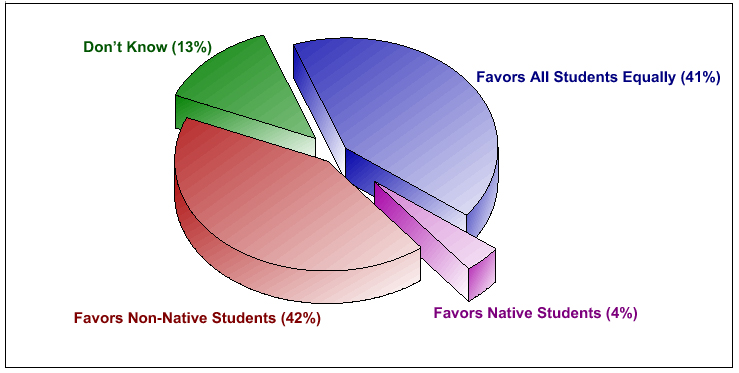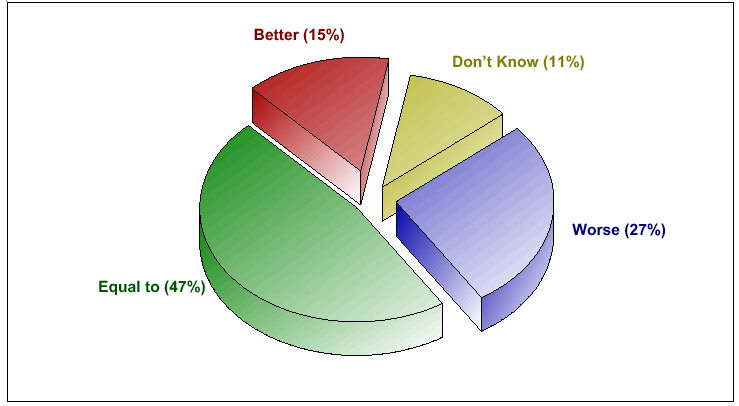Alaska Native Education Survey

BARRIERS
TO
EDUCATIONAL
SUCCESS
Respondents were asked several questions exploring educational barriers. The survey asked about the perception of the fairness of the system, treatment of Alaska Natives, and what they think is keeping Alaska Natives from finishing high school. It is critical to address these barriers for the long-run improvement of Alaska Native education.
Fairness and Equality Issues
A significant portion of Alaska Natives question the fairness of the system and believe that they do not get educational opportunities equal to those given other Alaskans.Over four in ten Alaska Natives felt the Alaska educational system favors non-Native students. Households with and without children held similar views. The inequality is felt more strongly by Alaska Natives living in urban areas (50 percent) and 35-54 year-olds (47 percent). Other data in this report also verifies the perception of prejudice is stronger in urban Alaska where Native students are more likely to be in the minority.

On a slight variation of the subject - educational opportunities rather than the Alaska education system - one half of those surveyed considered the educational opportunities offered Alaska Natives equal to those offered other Alaskans, while over one quarter (27 percent) disagreed. Only 15 percent believed Alaska Natives were offered better educational opportunities than other Alaskans.

Reasons for Not Completing High School
The number one reason for Alaska Natives to drop out of high school, according to respondents, is "family doesn't encourage schooling."The next most-common response for not completing high school was the abuse of alcohol and drugs.
When grouped according to subject (see second table below) , a number responses relate to personal situations that hinder Alaska Natives from staying in school (61 percent) . Personal reasons for dropping out included issues such as low self-esteem, lack of motivation, not wanting to leave home, pregnancy, peer pressure, and lack of discipline. Family issues (such as family responsibilities and violence/family problems) accounted for 38 percent of the reasons. A similar portion of responses (36 percent) were culturally-related such as traditional lifestyle, communication and teaching styles, and racial prejudice. Only 19 percent of the responses are academic-related.
Other survey results also support Alaska Native views on the importance of parental involvement. They place primary responsibility for educational success on parents and see parental involvement as an important solution for Native student success.
|
|
|
|
|
|
|
|
|
|
Family doesn't encourage schooling |
|
|
Alcohol/drugs |
|
|
Lack of interest/motivation |
|
|
Don't see benefit of education |
|
|
Teachers don't understand Natives |
|
|
Prejudice/discrimination |
|
|
Schools do not encourage Native students |
|
|
Family responsibilities |
|
|
Have difficulty with classes/learning |
|
|
Students not prepared in lower grades for high school |
|
|
Classes aren't geared to Natives |
|
|
Lack of self-esteem/confidence |
|
|
Other |
|
|
|
|
|
*Responses do not add up to 100%because most respondents gave more than one answer. |
|
Why Alaska Natives Do Not Complete High School
*Responses do not add up to 100%because most respondents
gave more than one answer.
Number One and Number Two Reasons Combined
(Responses grouped according to subject)
Alaska Native Education Survey
Return to the Alaska Native Household Education Survey
Return to the McDowell Final Report
Return to Alaska Native Knowledge Network